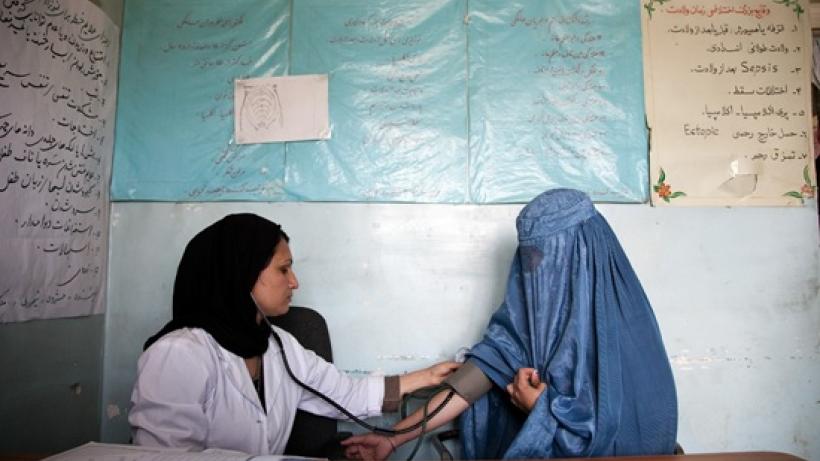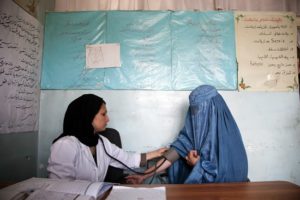
Building capacity in fragility: Key lessons from Fragility Commission’s 3rd evidence session
Generating effective government capacity is key to growth and development in fragile situations. However, many obstacles prevent governments from building up this capacity including an overwhelming list of problems to solve, weak leadership, corruption within institutions, and pressure from donors.
In fragile and conflict situations, governments often have little capacity to provide the public services necessary for economic growth and development. A vicious cycle persists where so many problems need fixing that government agendas become overloaded, making widespread failure to meet objectives more likely, and thereby impeding attempts to build capacity. These situations can be further complicated by weak political leadership, corruption, and competing donor interests.
In its third evidence session held at the LSE, the LSE-Oxford Commission on State Fragility, Growth and Development and its chair David Cameron called on four witnesses representing government and the donor community to present evidence and lessons learned from their experiences in generating effective state capacity. The following are key lessons presented at the session.
Leadership is everything
Sir Michael Barber, who on behalf of the UK government has worked extensively with the Punjab government in Pakistan to drive delivery of improved education and health, said any major reform efforts in fragile situations need to be backed by effective political leaders to have any chance of success. Ambitious, focused leaders can catalyse change and identify other ‘change agents’ within bureaucracies.
Ifueko Omoigui Okauru had first-hand experience being a change agent as head of Nigeria’s tax authority, the Federal Inland Revenue Service (FIRS) in 2004-2012. At the beginning of her tenure, Mrs Okauru stepped into an agency that, at the time, was perceived as highly inefficient and corrupt but counts her background in the private sector as an expert in organisational change, rather than an expert in tax, as key to her success in leading the agency. While tackling corruption could have easily overwhelmed her agenda, Mrs Okauru focused on reforming minds within the FIRS, engaging staff in her reform plan, and identifying champions within the agency.
Pockets of confidence
Overly ambitious government agendas can quickly become curses in fragile situations. As head of Afghanistan and Pakistan Affairs at USAID, Alex Thier saw ‘fantastic successes and spectacular failures’ in Afghanistan. The successes often began with positive local change that enabled broader change – for example, focusing healthcare efforts on low-cost but effective health solutions, such as training community health workers and midwives, which can work across the country. Mr Thier found that it was often easier to find capacity or ‘pockets of confidence’ at a local level than at a national level to successfully implement policies.

Woman in a health clinic in Afghanistan. Source: Flickr | World Bank
Sanjeev Gupta, Deputy Director of the IMF’s Fiscal Affairs Department, explained that the IMF’s strategy in fragile situations is incremental and categorises states into three stages – where there is 1) ongoing conflict, 2) conflict has ceased, and 3) a stable environment. Recognising that governments in fragile situations often have too little capacity to implement sophisticated taxes that require robust systems such as VAT and income tax, the IMF focuses on supporting simpler revenue collection such as taxes on trade, which governments can collect at the border.
Mr Gupta also pointed out that countries do not progress through the three stages in a linear fashion and can regress to earlier stages, which means the IMF’s technical assistance must be agile and flexible.
The problem with donors
Countries facing fragility rely significantly on foreign aid for revenues, receiving about 5% of GDP from external grants on average, according to Mr Gupta. While donors certainly play an important role in building state capacity, their involvement can sometimes be an obstacle to progress.
In some instances, donors end up extracting capacity rather than building it, said Mr Thier. For example, large international organisations such as the World Bank and UN often compete with a country’s public sector to recruit from the same pool of educated talent, except they can pay much higher salaries. In Afghanistan, one solution was for donors to embed their units within government ministries to build capacity. Donors can also invest in building up the physical infrastructure for government to be able to retain civil servants, and in the long term, support efforts to ensure government can recruit the best and brightest nationals.
The witnesses also pointed to the inability or unwillingness of many donors to get political as a hindrance to generating real impact. Mr Barber said the biggest successes he saw in Punjab came from donors influencing whole government health and education budgets, not from boutique aid initiatives. Understanding and working within the power and political structures of a country is key to making progress in fragile situations, said Mr Thier.
One perennial problem that all witnesses pointed to was lack of donor coordination, or a ‘NATO for the aid sector’ as Mr Thier called it. The lack of coordination leads to governments wasting big chunks of time and capacity responding to competing donor demands. Additionally, donor support and coordination needs to back a country’s national strategy, not their own interests. Mrs Okauru advised donors to ‘dig deeper’ before dictating solutions to understand the historic and systemic reasons for corruption and lack of capacity in fragile situations.
Finally, Mr Barber said the global community needs to imagine and set an end to aid – not because it failed, but because it succeeded.
Generating effective state capacity is one of five key dimensions of fragility that the commission is examining as part of its work to form policy recommendations for national and international actors to better support economic growth in countries facing fragility and conflict.
The remaining evidence sessions will take place in September 2017.

